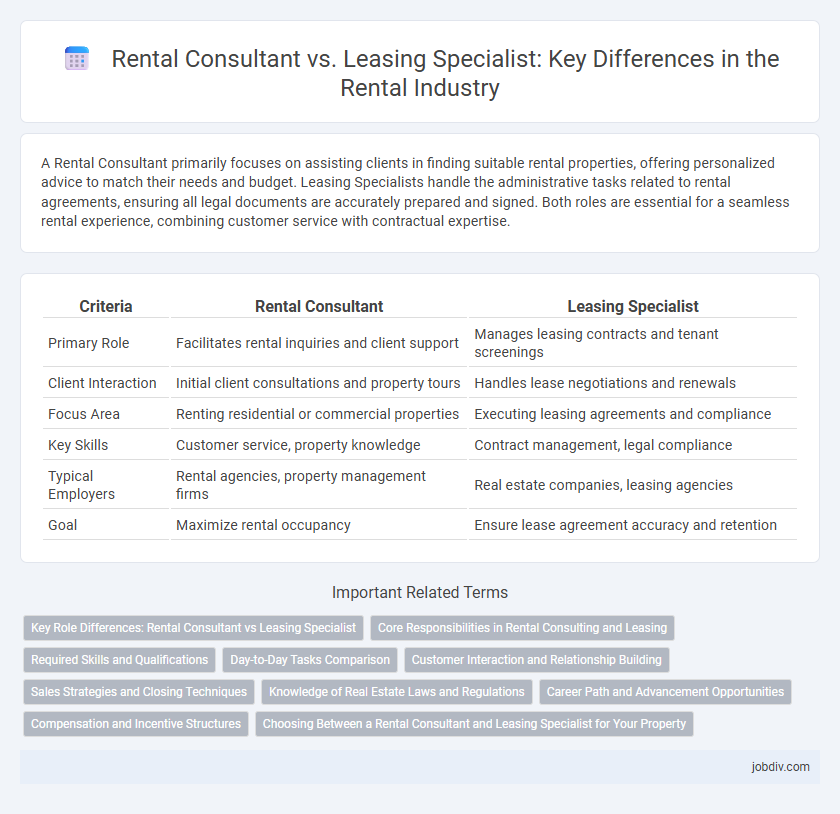A Rental Consultant primarily focuses on assisting clients in finding suitable rental properties, offering personalized advice to match their needs and budget. Leasing Specialists handle the administrative tasks related to rental agreements, ensuring all legal documents are accurately prepared and signed. Both roles are essential for a seamless rental experience, combining customer service with contractual expertise.
Table of Comparison
| Criteria | Rental Consultant | Leasing Specialist |
|---|---|---|
| Primary Role | Facilitates rental inquiries and client support | Manages leasing contracts and tenant screenings |
| Client Interaction | Initial client consultations and property tours | Handles lease negotiations and renewals |
| Focus Area | Renting residential or commercial properties | Executing leasing agreements and compliance |
| Key Skills | Customer service, property knowledge | Contract management, legal compliance |
| Typical Employers | Rental agencies, property management firms | Real estate companies, leasing agencies |
| Goal | Maximize rental occupancy | Ensure lease agreement accuracy and retention |
Key Role Differences: Rental Consultant vs Leasing Specialist
Rental Consultants primarily focus on customer service, guiding prospective tenants through property tours and addressing inquiries to facilitate a smooth rental process. Leasing Specialists concentrate on the administrative aspects, such as preparing lease agreements, verifying applicant information, and ensuring compliance with legal and company policies. Both roles collaborate to optimize tenant acquisition, but their key difference lies in client interaction versus contract management.
Core Responsibilities in Rental Consulting and Leasing
Rental Consultants primarily manage client interactions by assessing tenant needs, presenting suitable rental options, and facilitating property viewings to ensure client satisfaction. Leasing Specialists focus on drafting, negotiating, and finalizing lease agreements while ensuring compliance with local rental laws and property management policies. Both roles collaborate to maintain occupancy rates and streamline the rental process from inquiry to lease signing.
Required Skills and Qualifications
Rental Consultants require strong interpersonal skills, proficiency in customer service, and knowledge of property management software to effectively communicate rental terms and assist clients. Leasing Specialists must possess a solid understanding of lease agreements, attention to detail for contract accuracy, and skills in tenant screening and legal compliance. Both roles benefit from negotiation abilities, problem-solving skills, and knowledge of local housing regulations to ensure successful lease transactions.
Day-to-Day Tasks Comparison
Rental Consultants manage client interactions by showing properties, explaining lease terms, and processing applications, ensuring a smooth rental experience. Leasing Specialists focus on marketing rental units, conducting property tours, and handling lease signings while maintaining tenant records. Both roles require strong communication skills and knowledge of rental laws but differ in emphasis on sales versus administrative responsibilities.
Customer Interaction and Relationship Building
Rental consultants prioritize personalized customer interaction by understanding tenant needs and preferences, ensuring tailored rental solutions. Leasing specialists focus on efficient communication and maintaining long-term relationships through consistent follow-ups and lease negotiations. Both roles emphasize building trust and rapport to enhance tenant satisfaction and retention in the rental market.
Sales Strategies and Closing Techniques
Rental Consultants excel in personalized sales strategies by leveraging detailed tenant profiling and flexible negotiation techniques to close deals efficiently, while Leasing Specialists focus on volume-based approaches, utilizing streamlined leasing processes and standardized pitch methods to maximize occupancy rates. Rental Consultants often employ consultative selling to understand individual client needs, enhancing satisfaction and retention, whereas Leasing Specialists prioritize quick turnaround and consistent messaging to expedite lease signings. Both roles integrate CRM tools and market analysis, but Rental Consultants emphasize tailored solutions, and Leasing Specialists concentrate on high-volume lease closures.
Knowledge of Real Estate Laws and Regulations
Rental consultants and leasing specialists both require a strong understanding of real estate laws and regulations, including fair housing acts, tenant rights, and lease agreement standards. Rental consultants often emphasize compliance with local and state rental ordinances to advise tenants accurately, while leasing specialists focus more on contract negotiation and ensuring lease terms align with legal requirements. Mastery of these regulations helps prevent legal disputes and ensures smooth lease execution for both roles.
Career Path and Advancement Opportunities
Rental Consultants often begin their careers handling customer inquiries and processing rental agreements, building foundational skills in client relations and property management. Leasing Specialists typically advance by managing more complex leasing negotiations and portfolio oversight, positioning themselves for roles such as Property Manager or Leasing Director. Career progression in both paths focuses on expertise in rental market trends, contract law, and customer service excellence, with opportunities to specialize in commercial or residential property sectors.
Compensation and Incentive Structures
Rental Consultants typically earn a base salary with commission incentives tied to lease agreements signed, promoting a direct link between performance and earnings. Leasing Specialists often receive a combination of base pay plus bonuses based on occupancy rates or tenant retention metrics, encouraging long-term property value. Both roles may benefit from performance-based rewards, but Rental Consultants generally experience higher variable pay due to sales-driven compensation models.
Choosing Between a Rental Consultant and Leasing Specialist for Your Property
Choosing between a Rental Consultant and a Leasing Specialist depends on your property's specific needs and rental market focus. Rental Consultants typically offer comprehensive market analysis and tenant screening services, making them ideal for landlords seeking a strategic approach to tenant placement. Leasing Specialists concentrate on lease agreements and tenant relations, ensuring smooth contract management and occupancy rates for properties with high tenant turnover.
Rental Consultant vs Leasing Specialist Infographic

 jobdiv.com
jobdiv.com